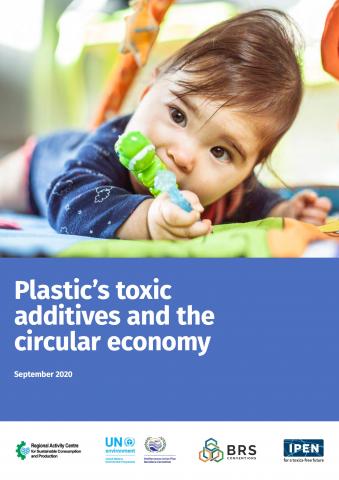Groups Back Call for Transparency on Toxic Chemicals in All Plastic Materials to Protect Human Health and the Environment from "Substances of Concern"
Citizens’ groups campaigning for a zero waste and toxics-free society in the Philippines have joined the call for transparency on hazardous chemicals used in plastic production and the ban on those that adversely affect human and environmental health.
The EcoWaste Coalition, Mother Earth Foundation (MEF) and the Interfacing Development Interventions for Sustainability (IDIS), which are all part of the International Pollutants Elimination Network (IPEN), issued the call for transparent chemical composition labeling on all plastic materials following the release of a global report identifying “substances of concern” in plastics.
Released last week, the report “Plastic’s Toxic Additives and the Circular Economy” shines a light on extensive evidence of toxic chemical components in plastics that can harm human and environmental health and impede a safe circular economy.
"This report is notable because it identifies hazardous chemical additives in common, widely available products and illustrates how they pose a threat to health and the environment whether in products, in waste, in recycling, landfill, or incineration. In order to achieve a non-toxic circular economy, we must ensure a precautionary approach to prevent hazardous chemicals in all stages of the lifecycle of plastics," said Dr. Sara Brosché, Science Adviser, IPEN.
Among the identified “substances of concern” in plastics that pose risks to human and environmental health are flame retardants, perfluorinated chemicals, phthalates, bisphenols, and nonylphenols. These substances, many of which are endocrine disrupting chemicals, are toxic additives in plastics that are commonly used in everyday consumer goods such as children’s toys, food packaging, electronics, textiles, upholstery, and furniture.
“The loads of undisclosed toxic additives in plastics can make recycling complicated, difficult and dangerous,” said Sonia Mendoza, Chairman of MEF, who also noted “this situation undermines efforts to eliminate plastic pollution and achieve the zero waste goal and validates our call for chemical transparency and clean production.”
“Policy makers and implementers, including the National Solid Waste Management Commission and local government units (LGUs), should use the report to enforce the prohibition on the manufacture, distribution or use of non-environmentally acceptable packaging (NEAP) materials under RA 9003, or the Ecological Solid Waste Management Act,” said Chinkie Peliño-Golle, Executive Director of IDIS, who added "the issuance of the long-overdue NEAP list as required by law will help household and community efforts to prevent and reduce waste and pollution."
“In line with the public’s right to know, we urge the authorities to require compulsory chemical content labeling in all plastic materials. Transparency in labeling is an essential tool that can assist policy makers, advocates, entrepreneurs and consumers in promoting industry shift to ecological and safe designs, materials and products that pose no harm to human health and the ecosystems,” said Thony Dizon, Chemical Safety Campaigner, EcoWaste Coalition.
Rolph Payet, Executive Secretary of the Basel, Rotterdam and Stockholm Conventions Secretariat, stated: “There are a wide variety of chemical additives in plastics, some of them have been identified as Persistent Organic Pollutants (POPs) and are now listed under the Stockholm Convention – for example, brominated flame retardants and fluorinated water repellents. However, it is challenging for countries to manage POPs and other hazardous chemicals added to plastics throughout their life cycle including when plastic wastes are finally disposed of or recycled.”
“We also need transparency on which plastics contain which additives, to enable their subsequent environmentally sound management. I urge industry and academia to intensify their efforts to find alternatives to such additives in plastics,” he further said.
The report describes four key approaches that can reduce the production and use of chemicals of concern, prevent regrettable substitutions, and realize a safe circular economy:
- "Materials should be designed in accordance with goals of causing no harm to environmental and human health and achieving zero waste."
- "Investment must be made to develop new, safer materials and systems that avoid the production and use of plastics with hazardous chemical additives. and avoid the replacement of toxic additives with regrettable substitutions."
- "Industry collaboration will be key for industry to take responsibility for the hazardous materials they produce."
- "Transparent chemical composition labelling must be applied to all plastic materials."
The report was produced by the Regional Activity Centre for Sustainable Consumption and Production (SCP/RAC) with the active involvement of other regional centers of the Basel and Stockholm Conventions, IPEN and experts from the Marine Litter Topic Group.
Reference:
https://ipen.org/sites/default/files/documents/ipen_pr_plastics_toxic_additives-en_1.pdf
https://ipen.org/documents/plastics-toxic-additives-and-circular-economy
https://ipen.org/sites/default/files/documents/ipen_pr_plastics_toxic_additives-en_1.pdf
https://ipen.org/documents/plastics-toxic-additives-and-circular-economy






Comments